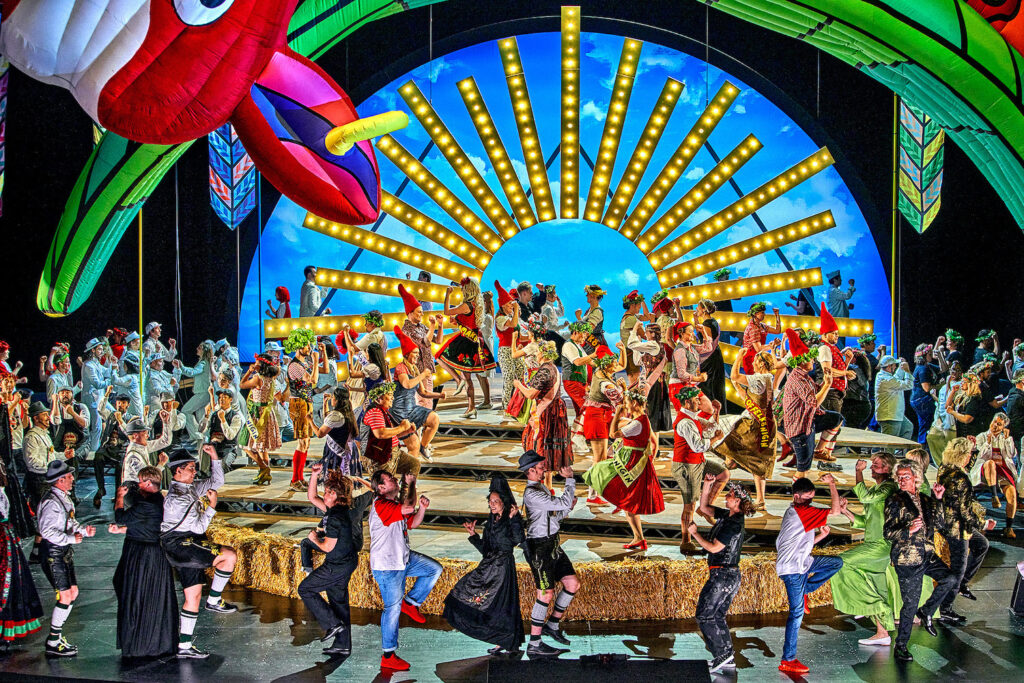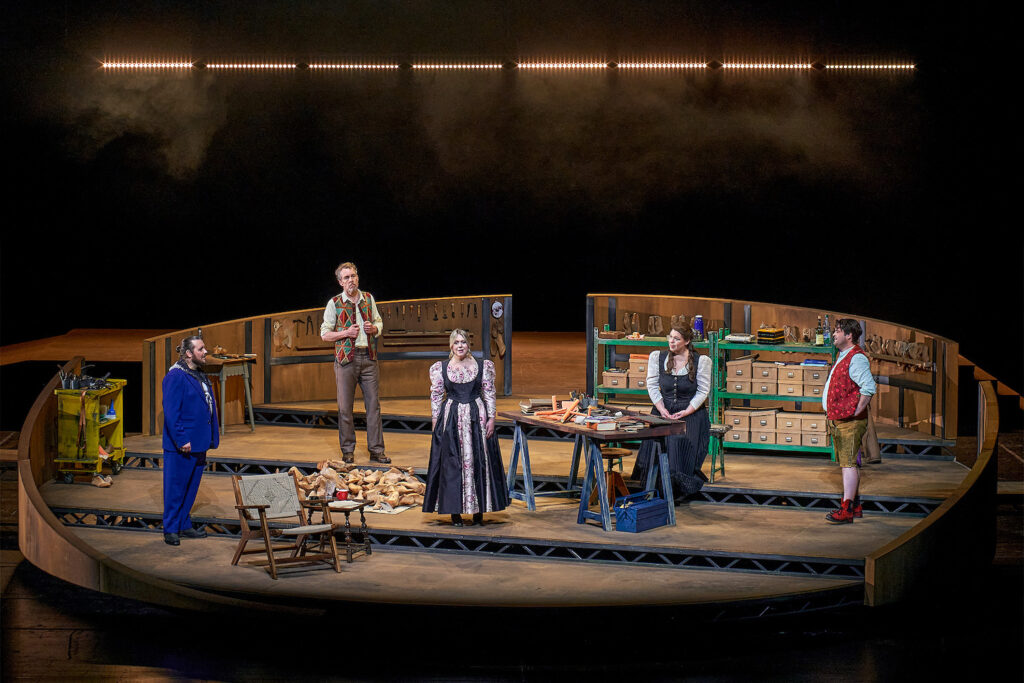Following the one with the gigantic blow-up of Beckmesser as a caricatured evil Jew. Zeitgeist has now made Beckmesser a populist rockstar, (lead photo, Michael Nagy as Beckmesser).
The problem is that he can’t really sing, as the good shoemaker meistersinger Hans Sachs likes to point out, causing a riot. Luckily, because the evening’s maestro liked nothing better than the opportunities offered by Wagner to create confusion. Carefully calculated confusion, that conductor Daniele Gatti first found, and amplified in Wagner’s magisterial overture, and then glorified into Wagner’s grandiose finale, a scene totally undone by stage director Matthias Davids (see photo under choreographer credit).
But the production was mostly about the sets, designed by Andrew D. Edwards, who created scenery not so long ago for Mary Poppins somewhere in Switzerland, and other extravagant musicals at Berlin’s famed Theater des Westins. The first act was but a narrow staircase leading way, way up to a tiny white church that exploded from its foundations at the end of the act with the realization that the love-at-first-sight romance of two adolescences had not much chance of leading anywhere. That’s just for starters — the following acts were a grandiose crescendo of spectacular scenic and staging prerogatives created by the director and designer.
Though the puppy love did, finally, lead somewhere, when Eva, in jeans and a bright yellow jacket was united with Walter at the end, dressed now in an even brighter blue suit. A truly massive numbers of choristers, some dressed as apprentices in boxer shorts and tee shirts, like Sachs’ apprentice David, joined the villagers in various traditional attire when not in bed cloths, plus the Meistersingers of Nürnberg (with robes and crowns, though in boxer pants like the apprentices, to celebrate the glories of German art in massive volume — though in this case it was but Walter’s song to love.
The sunburst radiated, the straw bails glowed, the flags waved, the massive blowup of the fantastic happy animal/fish (surely a sarcastic reference to Kosky’s Jew) righted itself after it was unplugged by the disgruntled Beckmesser, a sight gag sharpened because Beckmesser’s love guitar was plugged-in to a sound system that created its very electronic sound — it is maybe possible that Beckmesser himself played his guitar.
Not to forget the massive, silly, crowd choreography credited to Simon Eichenberger that was gamely, indeed very precisely, convincingly executed by the masses of choristers.

Bowing to tradition costumer Suzanne Hubrich dressed Beckmesser in robes with shades of black, in gentle reference to his status as town clerk. Elsewhere there were 19th century top hats, and bustled dresses mixed in. It was anytime everywhere European.
Director Matthias Davids bestowed myriad sight gags onto Wagner’s only comedy, laden though it may be with the philosophic overtones that one might expect the Bayreuth Festival to exploit. Schopenhauer be damned — in Act I Eva flew paper airplanes, plus there was a stage band that played along with the orchestra; in Act II Hans Sachs improvised jazzily on all sorts of percussive surfaces to Beckmesser’s serenade; in Act III Beckmesser shadowed the Hans Sachs and the two sets of lovers singing their famed quintet in mock accompaniment, these gags among the more egregious.
Amidst the excitement of disorder and confusion so carefully created by conductor Gatti there were moments of sublime lyricism, the hallmark of this famed Italian Wagner conductor. These moments however did not extend into his conducting of Hans Sachs’ famed “Wahn! Wahn! Überall Wahn!” that nearly collapsed from its precious delivery, as did the usually glorious quintet that comes a bit later in the act.
The singers as well were up for the game. The lovers Walter von Stolzing and Eva Pognersh were played by American tenor Michael Spyres and Swedish soprano Christina Nilsson, singers of massive, quite beautiful voices, of great stamina. Both are mature artists whose voices have not lost their youthful sheen, nor their verve (nerve) for impersonating adolescents. Both gave total performances in glorious voice.

The Bayreuth Festival awarded the title role of Die Meistersinger to bass baritone Georg Zeppenfeld, an accomplished artist who has fulfilled many important roles over the years in Bayreuth Festival productions. Easily accomplishing the vocal demands of a Hans Sachs he did not fill the Hans Sachs shoes, those of an established, venerable, senior fellow of the Meistersinger community. His was a tentative presence that left us bereft of the role’s philosophic importance — the Meistersinger’s sacrifice, and his respect for innovation and for community tradition.
Magdalena was played by mezzo soprano Christa Mayer (the following evening’s Das Rheingold Fricka). A mature artist, she too found the vocal presence to convincingly play the adolescent companion of Eva, and the future wife of the genuinely young Hans Sachs apprentice David, played by tenor Matthias Stier, recently of the Dresden young artist program. The role lies low in the tenor range, causing Mr. Stier some difficulties in its occasional upper reaches, though he well filled the role.
Beckmesser was performed by German baritone Michael Nagy who brought discreet amounts of caricature to this often controversial role, diffusing any cultural overlays. His character insisted that he fulfill, ridiculously, the adolescent rock-star ideal. Like all the principals of this production he relished, or maybe gamely accomplished his assignment.
Pogner, Eva’s father and Hans Sachs’ neighbor was played by Korean bass Jongmin Park. Of a solid presence and deep, sonorous bass voice he well anchored the community traditions of a father, and its misgivings, while respecting the needs and desires of new generations. The additional meistersingers accomplished their parts with panache, as did veteran bass Tobias Kehrer who twice crossed the stage in the cameo role of the night watchman.
It was not a controversial evening in Bayreuth, nor one of great conceptual discovery, other than finding what possible comedy may be wrenched from Wagner’s only foray into the genre.
Michael Milenski
Festspielhaus, Bayreuth, Germany, July 25, 2025
All photos copyright Enrico Nawrath, courtesy of the Bayreuth Festival.